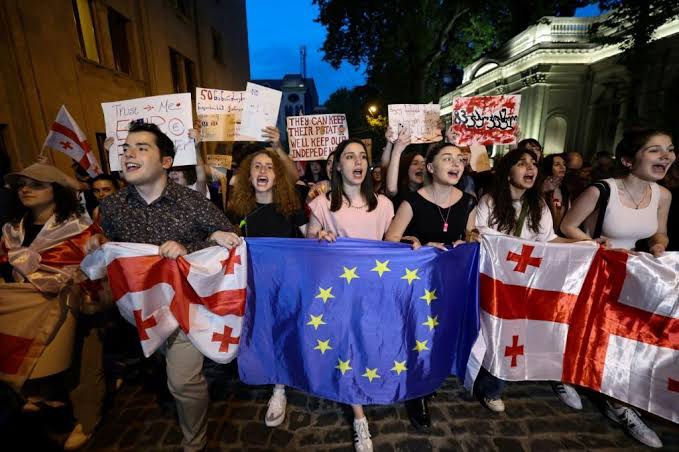Georgia faces Pro-EU protests, arrests amid controversial “foreign influence” bill

Authorities in Georgia arrested 63 demonstrators during a late-night rally, according to government officials, following a violent crackdown by police on thousands of pro-European Union (EU) protesters opposing a proposed “foreign influence” bill. The police used tear gas, rubber bullets, and water cannons to disperse the crowd, raising concerns over the government’s handling of dissent.
The protests, which have been ongoing since April 9, were ignited by the ruling Georgian Dream party’s attempt to revive a controversial law seen by critics as hindering the country’s path to EU membership. The legislation has drawn sharp criticism from the European Union, with Brussels viewing it as a threat to Georgia’s democratic aspirations.
Violence erupted during a peaceful rally outside the Georgian parliament on Tuesday evening. Riot police, wearing masks and riot gear, aggressively dispersed the demonstrators, using rubber bullets, tear gas, and water cannons to suppress the crowd. An AFP reporter witnessed officers beating and arresting numerous individuals, including journalists and opposition leaders. Lawmaker Levan Khabeishvili, chairman of the opposition United National Movement, was severely beaten, and an AFP photographer was attacked despite being clearly identified as press.
The violent crackdown prompted a strong reaction from Georgia’s President Salome Zurabishvili, who called on the interior minister to immediately halt the use of disproportionate force. Despite the police’s aggressive tactics, the protesters continued their demonstration into the night, blocking traffic on Rustaveli Avenue and other key roads across Tbilisi. By early Wednesday morning, the rally had ended, but further protests were expected to take place later in the evening.
The interior ministry issued a statement claiming that the police used “legitimate force” only after protesters engaged in violent confrontations with law enforcement. However, Georgia’s rights ombudsman, Levan Ioseliani, called for an investigation into the alleged use of excessive force. The bill at the center of the protests, which resembles Russian legislation used to suppress dissent, is set for further debate in parliament on Wednesday.
EU officials, including chief Charles Michel, have condemned the proposed “foreign influence” bill, stating that it contradicts Georgia’s EU aspirations. The bill, if passed, would require non-governmental organizations and media receiving over 20 percent of their funding from abroad to register as entities working for “foreign powers.” Despite these controversies, the ruling Georgian Dream party continues to push for the bill’s adoption, facing significant resistance from a populace that largely supports the country’s bid for EU membership.












